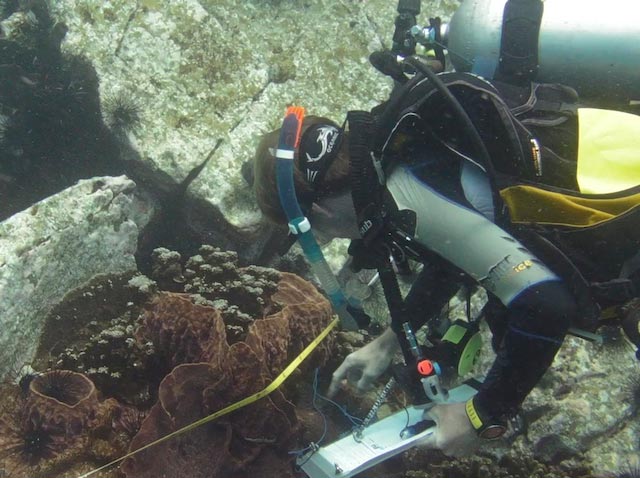 Conservation is foremost about protection but with that comes the need for research. Here in Cambodia we can see clearly that need for conservation every time we go diving, there is a desperate need for direct action and protection of the marine environment.
Conservation is foremost about protection but with that comes the need for research. Here in Cambodia we can see clearly that need for conservation every time we go diving, there is a desperate need for direct action and protection of the marine environment.
We also witness this need when we see endangered species for sale in local markets, when we hear dynamite explosions whilst diving, when we see illegal trawling within the delicate habitats of the inshore areas, and when we see the use of cyanide and other destructive fishing techniques on our local reefs and ecosystems. These are all events that bring immediate attention to the need for immediate action.
An example of how our research is used to complement the conservation efforts is in the creation of the new Marine Fisheries Management Area around Koh Rong and Koh Rong Samloem, our socio-demographic survey reports and marine survey reports were used to highlight the most bio-diverse areas and those in need of protection, to be used in the MPA planning process and creation of zoning management maps. With that MPA in place we were invited to do it all over again in another even more sensitive marine environment, the marine habitats of seagrass and coral reef within the south eastern coastal province of Kep. This work is now underway and the beginnings of a new marine fisheries management area and marine protected area are underway. You can read the initial marine assessment reports and summary recommendation reports here.
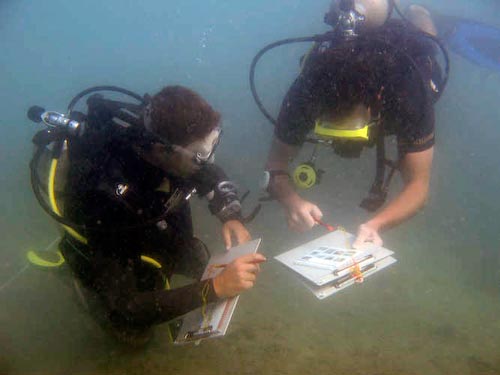 The need for immediate Pro-active conservation must be coupled with the collection of solid data to prove beyond doubt which actions have are having a detrimental effect on the local ecosystems and also to prove the benefits of any conservation programs. When witnessing first hand the large amount of damage that can be done in a very short time it is easy to understand the need for protection but for anyone not directly witnessing the destruction a need for clear data is essential. When we take action towards marine conservation we need to assess whether an area needs protection, why it needs protection and what it needs protection from. These are just a few of the major questions we need to ask. We need to look at all factors from the obvious to the not so obvious.
The need for immediate Pro-active conservation must be coupled with the collection of solid data to prove beyond doubt which actions have are having a detrimental effect on the local ecosystems and also to prove the benefits of any conservation programs. When witnessing first hand the large amount of damage that can be done in a very short time it is easy to understand the need for protection but for anyone not directly witnessing the destruction a need for clear data is essential. When we take action towards marine conservation we need to assess whether an area needs protection, why it needs protection and what it needs protection from. These are just a few of the major questions we need to ask. We need to look at all factors from the obvious to the not so obvious.
Critical thinking is required and science is needed. By investigating marine ecosystems to quantify the biodiversity and abundance of flora and fauna then measure the impact of external activities we can start to draw conclusions about the negative and positive effects each action has on our local marine ecosystems.
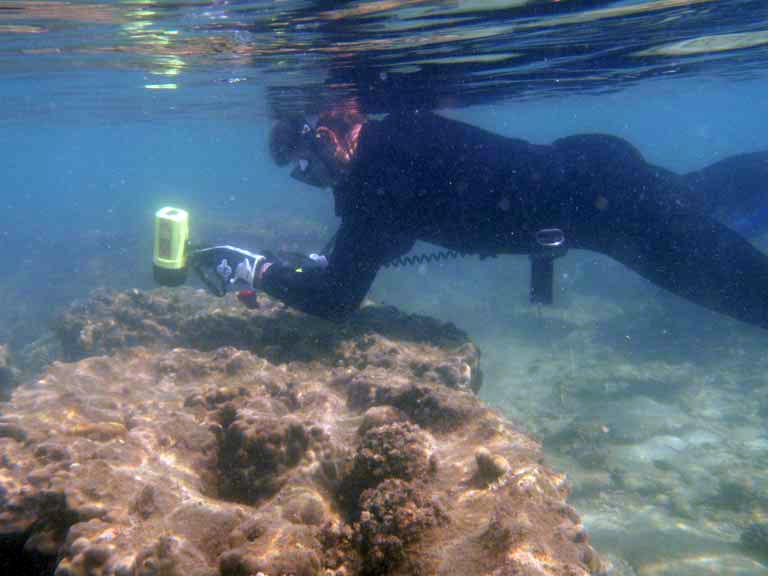 Through a scientific monitoring program our team of scientific researchers and trained research divers investigate the marine environmental conditions within specific areas, this information has and is being used to assist the local and national government in their strategy planning for marine conservation and integrated coastal management. As part of our team you will be involved in marine conservation and marine research, this means that during your time with us you will be trained in a number of marine survey methodologies and identification techniques that will allow you to monitor our target sites. Besides learning the methodology of collecting data, you will also learn how to enter and analyse that data. The identification training will allow you to learn about which species live in Cambodian coastal ecosystems and how to recognize them.
Through a scientific monitoring program our team of scientific researchers and trained research divers investigate the marine environmental conditions within specific areas, this information has and is being used to assist the local and national government in their strategy planning for marine conservation and integrated coastal management. As part of our team you will be involved in marine conservation and marine research, this means that during your time with us you will be trained in a number of marine survey methodologies and identification techniques that will allow you to monitor our target sites. Besides learning the methodology of collecting data, you will also learn how to enter and analyse that data. The identification training will allow you to learn about which species live in Cambodian coastal ecosystems and how to recognize them.
For those that develop a passion and want to learn more about marine research further training can be given to take you up to the level of team leader.
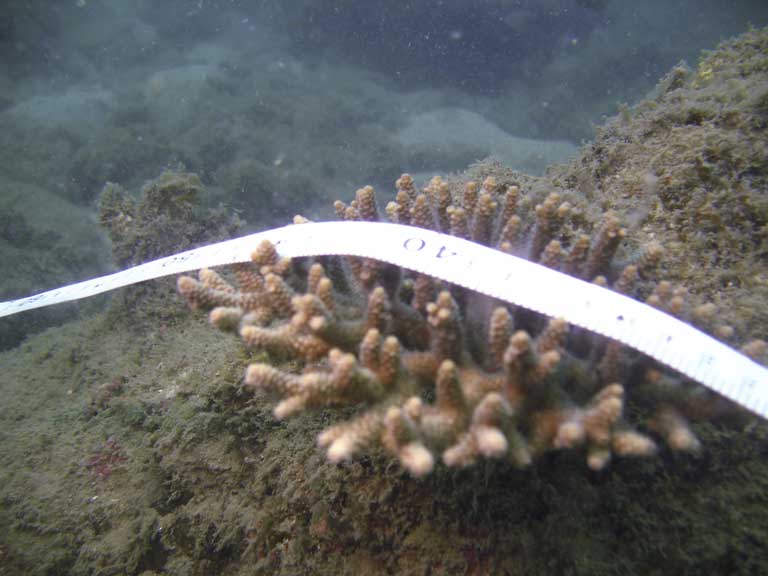 Once trained you will join together with other volunteers, interns and specialists and spend time in the field, conducting marine surveys using the scientific techniques you have learnt in order to collect, collate and analyse data on the marine environment. Investigative projects include seahorses surveys, Benthic Surveys, biodiversity and abundance surveys to name a few.
Once trained you will join together with other volunteers, interns and specialists and spend time in the field, conducting marine surveys using the scientific techniques you have learnt in order to collect, collate and analyse data on the marine environment. Investigative projects include seahorses surveys, Benthic Surveys, biodiversity and abundance surveys to name a few.
This information once analysed and written up into report form is then submitted to the Cambodian Fisheries Administration and the local Provincial Government, in turn this assists the Royal government of Cambodia in managing and maintaining a sustainable marine environment for future generations.
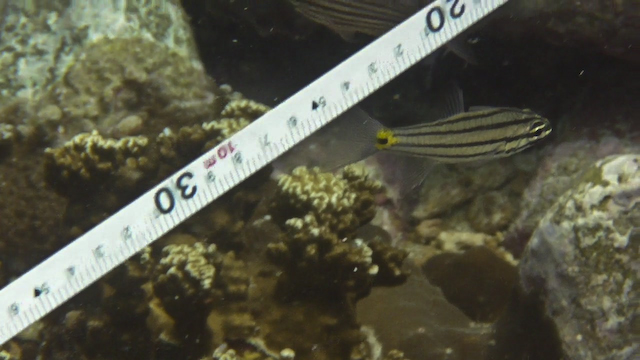 Our Team is among the few to be out there all the time, doing research and keeping the destruction at bay. We are conducting extensive surveys throughout the coast of Cambodia. In our first 2 years of operation we recorded data from over 1000 different sites and now after 8 years of operation we have extensive experience covering Cambodian marine habitats, ecosystems and marine life, from community socio-demographics to quarterly and yearly reports on marine reef heath, seahorse diversity, abundance and seagrass monitoring we pretty much do it all.
Our Team is among the few to be out there all the time, doing research and keeping the destruction at bay. We are conducting extensive surveys throughout the coast of Cambodia. In our first 2 years of operation we recorded data from over 1000 different sites and now after 8 years of operation we have extensive experience covering Cambodian marine habitats, ecosystems and marine life, from community socio-demographics to quarterly and yearly reports on marine reef heath, seahorse diversity, abundance and seagrass monitoring we pretty much do it all.
Many of these sites had never been researched or reported on before. We are pushing the boundaries of the known territories in underwater Cambodia! Now we are breaking new ground again after being invited to study a whole new undived and unexplored province.
